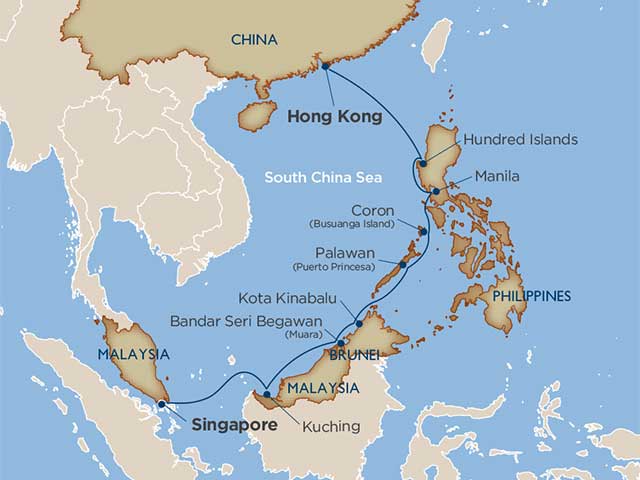On this date in April 1578 occurred an early example of the first wave of globalization when a Spanish led army, based in the Philippines, descended on the capital of Sultanate of Brunei, on the island of Borneo. The Spanish force included Spaniards, Filipino tribesmen, and Mexican warriors. Opposing them were Ottoman Turks, Egyptians, Somalis, Gujaratis, and Malays. Welcome to the New World Order!
I'm not particularly interested in the battle itself as the entire campaign (the Spanish won the battle but eventually withdrew after being overwhelmed by disease) is yet another dreary chapter of warfare but was fascinated by the diversity of the combatants.

The Spanish first encountered the Philippines when Magellan landed in 1521, during the first circumnavigation of the globe. The Filipinos promptly killed Magellan and the voyage was eventually completed by eighteen survivors of the original crew of 235. During the 1560s the Spanish began the conquest of the islands. They also pioneered a Pacific trading route from China and the Philippines to Acapulco, Mexico from where goods were transhipped to Mexico City and then on to the east coast from where they could be shipped to Europe. It was this trade that led Charles Mann, author of 1493, to describe Mexico City as the first global city (though Rome or Alexandria might be earlier contenders for this title) as described in Ten Years After:
Chinese, Japanese and Southeast Asians ended up in Mexico and Mann claims the first Chinatown in the Americas was in Mexico City, centered around an Asian marketplace built upon atop the old city center of Tenochtitlan. Samurai protected the trade caravans as they moved from Acapulco to Mexico City. The ceramics industry started in Puebla, Mexico and probably employed immigrant Chinese workers who brought their designs along with them.
The standard 17th century text on China for Europeans, published in editions in many languages, was a History of the Most Notable Things, Rituals and Customs of the Great Kingdom of China composed by Juan Gonzalez de Mendoza, a Dominican in Mexico City and a 17th century traveler, described an Easter Parade in the city:
"a company of soldiers . . . on horseback, and was preceded by mournful horn-players. When the procession came to the royal palace, the Chinese and the [Franciscans] fought to be at the head of the line; they beat each other over the shoulders with clubs, and with their Crosses; and many were wounded."We'll close with these words from 1493:
. . . Mexico City's multitude of poorly defined ethnic groups from Africa, Asia, Europe and the Americas made it the world's first truly global city . . . it was the place where East met West under an African and Indian gaze. Its inhabitants were ashamed of the genetic mix even as they were proud of their cosmopolitan culture, perhaps none more so than the poet Bernard de Balbuena, whose Grandeza Mexicana is a two hundred page love letter to his adopted home. "In thee," he wrote addressing Mexico City,
Spain is joined with China
Italy with Japan, and finally
an entire world in trade and order.
In thee, enjoy the best of the treasures
of the West; in thee, the cream
of all luster created in the East.
The specific tribal identities of the Mexican warriors who joined the Spanish during the conquest of the Philippines are not known, but they are most likely to have been Tlaxcalans, allies of Cortez during his war with the Aztecs and who continued to enjoy favored status under Spanish rule, or from the upper strata of Aztecs who married into the Spanish aristocracy.
As to the crew supporting the Sultan of Brunei, we have descriptions of their ethnicities but not how they ended up in Borneo. During the 15th century the rulers of Brunei were converted to Islam and the sultanate became a powerful state during the 16th and 17th centuries, and all those mentioned would have been Muslim.
It was coming across this reference to the battle in 1578 that prompted me to track down the book I recently read on Ottoman expansion in the Indian Ocean but was unable to find there, or elsewhere, any further explanation of how Ottomans and other enlisted in the service of the Sultan of Brunei.
The Ottomans and Egyptians may have been part of the detachment of gunners and soldiers sent by the Ottoman sultan to Aceh in Sumatra in preparation for an offensive against the Portuguese (which was ultimately derailed). The Gujarati kingdom was also fighting the Portuguese, and the Gujarati fighters may have come to Borneo to help against another Christian incursion, while Muslim Malays had repeatedly tried to expel the Portuguese from Malacca. In that respect, the events of 1578 can also be seen as a religious war.
No comments:
Post a Comment